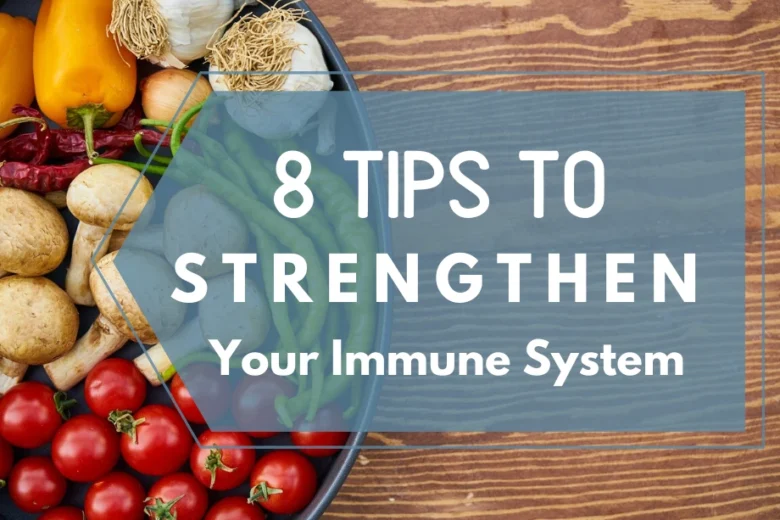Your immune system works around the clock, defending your body against countless threats you never even notice. From the common cold to more serious infections, this complex network of cells, tissues, and organs serves as your personal security team.
Building robust immune health isn’t about finding a magic bullet or relying on the latest superfood trend. It’s about understanding how your body’s defenses work and supporting them through evidence-based strategies that fit into your daily life.
Many people only think about their immune system when they’re already sick, but prevention starts long before symptoms appear. The choices you make every day—what you eat, how you move, how you sleep, and how you manage stress—all play crucial roles in determining how well your immune system can protect you.
This guide will walk you through the science behind immunity and provide practical, actionable steps you can take to strengthen your body’s natural defenses. You’ll learn which nutrients actually make a difference, how lifestyle factors impact immune function, and what supplements are worth considering.
Understanding Your Immune System
Your immune system operates like a sophisticated military organization, with multiple layers of defense working together to keep you healthy. Understanding these components helps you make informed decisions about supporting your immunity.
Innate vs. Adaptive Immunity
Your body maintains two distinct but interconnected defense systems. Innate immunity serves as your first line of defense, responding immediately to any perceived threat. This system includes physical barriers like your skin and mucous membranes, as well as specialized cells that attack foreign invaders on contact.
Adaptive immunity, meanwhile, develops targeted responses to specific threats over time. This system creates a memory of past infections, allowing for faster and more effective responses if the same pathogen appears again. Vaccines work by training your adaptive immune system to recognize and fight specific diseases.
Key Players: Cells and Organs
Your immune system relies on various specialized cells working in coordination. White blood cells, or leukocytes, serve as the primary defenders. These include neutrophils that engulf bacteria, lymphocytes that coordinate immune responses, and natural killer cells that destroy infected or abnormal cells.
Several organs support immune function throughout your body. Your bone marrow produces immune cells, while your spleen filters blood and removes old or damaged cells. Lymph nodes act as filtering stations where immune cells can encounter and respond to threats, and your thymus gland helps train certain white blood cells to distinguish between your body’s own cells and foreign substances.
Nutrition for Immune Support
The connection between nutrition and immune function runs deeper than most people realize. Your immune system requires specific nutrients to function optimally, and deficiencies in key vitamins and minerals can significantly compromise your body’s ability to fight infections.
Essential Vitamins and Minerals
Vitamin C plays multiple roles in immune function, supporting the production and function of white blood cells while acting as a powerful antioxidant. However, contrary to popular belief, taking massive doses won’t necessarily prevent illness if you’re already getting adequate amounts through your diet.
Vitamin D functions more like a hormone than a traditional vitamin, regulating immune responses and helping your body maintain the delicate balance between fighting infections and avoiding autoimmune reactions. Many people have insufficient vitamin D levels, especially during winter months or in regions with limited sunlight.
Zinc supports numerous immune processes, from wound healing to the development of immune cells. Even mild zinc deficiency can impair immune function, making adequate intake particularly important during times of stress or illness.
Other crucial nutrients include vitamin E, which protects cell membranes from damage; selenium, which supports antioxidant enzyme production; and iron, which helps carry oxygen to tissues and supports immune cell function.
Top Immune-Boosting Foods
Rather than focusing on individual nutrients, aim to eat a varied diet rich in whole foods. Citrus fruits provide vitamin C along with flavonoids that enhance its absorption and effectiveness. Berries offer antioxidants that protect immune cells from damage, while leafy greens supply folate, which supports the production of new immune cells.
Garlic contains compounds that stimulate immune cell activity and may help reduce the severity and duration of cold symptoms. Yogurt and other fermented foods support gut health, which plays a crucial role in overall immune function since about 70% of your immune system is located in your digestive tract.
Nuts and seeds provide vitamin E, zinc, and healthy fats that support immune cell membrane integrity. Sweet potatoes and other orange vegetables supply beta-carotene, which your body converts to vitamin A—essential for maintaining the health of your skin and mucous membranes.
Lifestyle Factors That Impact Immunity
Your daily habits significantly influence how well your immune system functions. Small changes in exercise, stress management, and sleep can create substantial improvements in your body’s ability to fight off infections.
The Role of Exercise
Regular physical activity enhances immune function through multiple mechanisms. Moderate exercise increases the circulation of immune cells, helping them move more efficiently throughout your body to detect and eliminate threats.
Exercise also reduces chronic inflammation, which can interfere with normal immune responses. Physical activity triggers the release of endorphins and other compounds that support immune function while helping manage stress levels.
However, the relationship between exercise and immunity follows a U-shaped curve. While moderate activity boosts immune function, excessive high-intensity training can temporarily suppress immunity, creating a window of increased infection risk. Aim for consistency rather than intensity, focusing on activities you enjoy and can maintain long-term.
Stress Management Techniques
Chronic stress suppresses immune function by elevating cortisol levels and promoting inflammation. Learning to manage stress effectively isn’t just good for your mental health—it’s essential for maintaining strong immunity.
Deep breathing exercises activate your parasympathetic nervous system, promoting relaxation and supporting immune function. Even five minutes of focused breathing can help reduce stress hormone levels.
Meditation and mindfulness practices have been shown to strengthen immune responses while reducing markers of inflammation. You don’t need hours of daily practice to see benefits; even brief, consistent sessions can make a difference.
Social connections also play a surprising role in immune health. People with strong social support networks tend to have better immune function and recover more quickly from illness. Make time for meaningful relationships and community involvement.
The Importance of Sleep
Sleep and immunity share a bidirectional relationship—poor sleep weakens immune function, while infections can disrupt sleep quality. During sleep, your body produces and releases cytokines, proteins that help coordinate immune responses.
Adults need 7-9 hours of quality sleep nightly for optimal immune function. Sleep deprivation reduces the production of protective antibodies and increases susceptibility to infections. Studies show that people who sleep less than six hours per night are four times more likely to catch a cold when exposed to the virus.
Creating a consistent sleep schedule helps regulate your body’s circadian rhythms, which influence immune function. Keep your bedroom cool, dark, and quiet, and avoid screens for at least an hour before bedtime.
Supplements for Immune Health
While a balanced diet should provide most nutrients needed for healthy immune function, certain supplements may offer additional support, especially during times of increased stress or illness risk.
Vitamin D
Many people have insufficient vitamin D levels, particularly those living in northern climates or spending limited time outdoors. Vitamin D supplementation may be beneficial if blood tests reveal deficiency, but dosing should be individualized based on current levels and individual needs.
Vitamin C
Vitamin C supplements may help reduce the duration and severity of cold symptoms, though they’re unlikely to prevent illness in healthy individuals consuming adequate amounts through food. High doses aren’t necessarily better and may cause digestive upset.
Zinc
Zinc lozenges or supplements may help reduce cold duration when taken at the first sign of symptoms. However, long-term high-dose zinc supplementation can interfere with copper absorption and other immune functions.
Elderberry
Some studies suggest elderberry extract may help reduce the duration and severity of flu symptoms. The compounds in elderberries appear to inhibit viral replication and support immune cell function.
Probiotics
Certain probiotic strains may help support immune function by promoting a healthy gut microbiome. Look for supplements containing well-researched strains like Lactobacillus and Bifidobacterium species.
Debunking Immune Health Myths
The immune health space is filled with misconceptions that can lead to ineffective or even harmful practices. Understanding what doesn’t work is just as important as knowing what does.
The myth that you can “boost” your immune system through extreme measures persists despite lack of scientific support. Your immune system functions best when balanced, not overstimulated. Attempts to drastically enhance immune responses can actually increase the risk of autoimmune reactions.
Expensive immune-boosting supplements and products often promise unrealistic results. No single supplement or superfood can compensate for poor overall health habits. Focus on consistent, evidence-based approaches rather than searching for quick fixes.
The idea that being cold makes you sick is another persistent myth. While cold weather may increase your likelihood of catching respiratory infections by bringing people indoors where viruses spread more easily, cold temperatures themselves don’t directly cause illness.
Similarly, the belief that sweating out a fever or illness helps recovery isn’t supported by science. Fever serves an important immune function, and attempting to sweat it out through intense exercise can actually hinder recovery and potentially worsen symptoms.
Building Your Personal Immune Health Strategy
Strong immune health results from consistent daily choices rather than dramatic interventions. Start by evaluating your current habits and identifying areas for improvement. Small, sustainable changes often produce better long-term results than attempting major lifestyle overhauls.
Focus on foundational practices first: aim for 7-9 hours of quality sleep, eat a varied diet rich in whole foods, engage in regular moderate exercise, and develop effective stress management techniques. These basics provide the strongest foundation for immune health.
Consider supplements thoughtfully, ideally with guidance from a healthcare provider who can assess your individual needs. Remember that supplements work best as additions to, not replacements for, healthy lifestyle practices.
Pay attention to your body’s signals and adjust your approach as needed. During periods of high stress or increased infection risk, you might need extra sleep, more nutrient-dense foods, or additional stress management support.
Your immune system is remarkably adaptable and responsive to the care you provide. By understanding how immunity works and implementing evidence-based strategies, you can support your body’s natural defenses and enjoy better health throughout the year. The investment you make in immune health today pays dividends in energy, vitality, and resilience for years to come.




